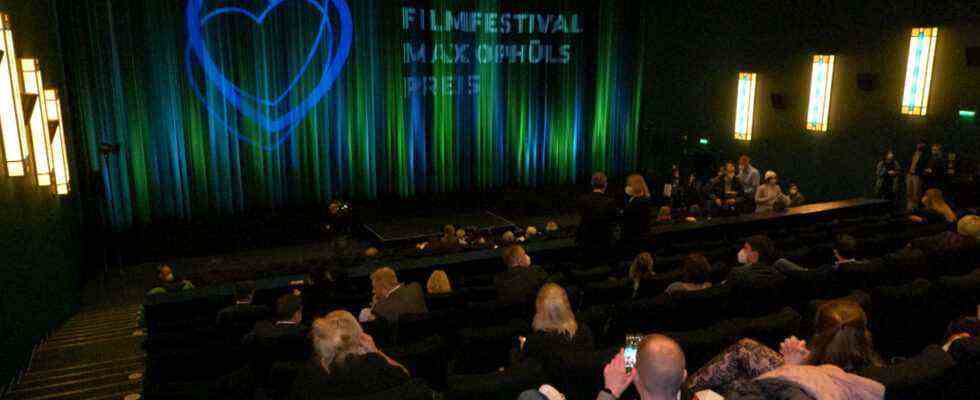Status: 01/18/2022 1:39 p.m
How do festivals work in pandemic times? The film festival “Max Ophüls Preis” in Saarbrücken is currently demonstrating this. The organizers rely on a hybrid mix of presence cinema and streaming.
Neither the organizers nor the young filmmakers and spectators can really believe it when the curtain rises in Hall 1 of the Saarbrücken Cinestar. The cinema hall is half empty, but still: a festival opening is in the offing. It will be broadcast live in eight other Saarland cinemas, streamed on the festival website and on YouTube. Until the very end, there were fears as to whether the opening could take place as planned. “We are prepared for the official closure of the cinemas and could switch completely to online at any time thanks to the hybrid structure,” explains festival director Svenja Böttger. Of course nobody here hopes that.
The Film Festival “Max Ophüls Prize”
Around 45,500 visitors came to the last “Max Ophüls Prize” event in January 2020. Last year, around 12,800 users used the purely online offer, and there were around 39,000 film viewings. In this year’s hybrid concept, 80 films will be shown until January 26th. Of these, 49 competition films compete for a total of 18 prizes. These are endowed with 118,500 euros. The young filmmakers from Germany, Austria and Switzerland mostly deal with current social problems, including climate change, abuse of power and the discussion about sexual identities.
Only 50 percent utilization
The concept has been checked by the regulatory office. Only those who have recovered or have been fully vaccinated and tested come into the cinemas. The cinema halls can only be used up to 50 percent, so the festival has been stretched to eleven days. And the good old popcorn trick has to be dropped, the spectators remain seated, in the style of a chessboard pattern. One or two spaces always remain free between them. Each competition film is only shown once, but in several cinemas at the same time. The artist talks in the main hall are recorded by cameras and also streamed live. Other film series are only available online.
But how is the model project received by the public? The organizers are satisfied with the sales in both areas. “On the one hand, that’s because we made a lot of fuss beforehand. We advertised the concept and tried to explain everything as best we could on our website,” reports the festival director. In addition, people have long been used to online streaming.
The 2G Plus rule applies to face-to-face events at the festival.
Image: Frauke Feldmann/SR
Lack of funding and changed scripts
The good response is not only good news for the organizers, for whom the hybrid concept means a great deal of additional expense. Many young filmmakers are also suffering from the consequences of the pandemic. After there was a film backlog last year due to the closed cinemas, fewer films were submitted this time. Financing was difficult, especially in the feature film sector. “One notices above all in the independent productions and projects that it is of course particularly difficult for them to find opportunities to finance themselves,” says Böttger. Donors and sponsors are less willing to take risks. A few projects have been withdrawn entirely. Others were stuck in post-production.
Alison Kuhn was lucky with the financing: the budget for her short film “Fluffy Tales” about abuse of power was covered by the Film University Babelsberg Konrad Wolf. Nevertheless, the student had to rethink and replan several times. “I actually wanted to shoot a completely different film in March 2020. Then we had to stop shooting because of Corona. After that I waited months for production to start again.” However, her original story became unworkable due to too many touches. “I had to put together a whole new film within a few weeks.”
Also because of such individual fates, it was important to the organizers to allow the festival to take place at least partially in person. Böttger emphasizes that it was the chance encounters at the festival between screenwriters, directors and sponsors that made Ophüls special. “Unfortunately, we cannot offer the exchange in the usual form.” Nevertheless, there is a chance to meet at least two or three people. There are also online offers such as speed dating and a digital marketplace for screenplays.
The contacts made at the festival are particularly important for young filmmakers.
Image: Frauke Feldmann/SR
“We want to send a signal”
According to the city of Saarbrücken, it is “extremely happy” that the festival can take place again. “We want to send a signal from Saarbrücken to an industry that is suffering the most from the pandemic,” emphasizes Lord Mayor Uwe Conradt. It is also nice that the hybrid format reaches festival fans everywhere and people who otherwise would not have had the chance to see many films.
At the end, all visitors quickly leave the cinema. There is not much talk about the opening film anymore. But that is certainly also due to the fact that you have to digest the material first. “Everything will change” by Marten Persiel is a dystopia that takes place in the year 2054 and is about the extinction of species. Images and music go hand in hand. Just like the fact that you can finally experience a festival premiere again. “Films are made for the screen. Seeing a film on the screen is simply something different,” organizer Böttger and filmmaker Kuhn agree. The student is now looking forward to her own premiere – and hopes that Corona will no longer thwart her and the festival.

